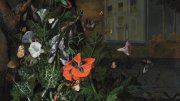Arthur J. Rosenthal, who founded Basic Books and directed Harvard University Press (HUP) from 1972 to 1990, died Saturday at age 93 at his home in Manhattan, The New York Times reported. Rosenthal was widely recognized for operating at the boundaries between the academic and trade markets, publishing scholarly works designed to appeal to a general audience.
He assumed the directorship of HUP at a moment of crisis. The press, with its focus on publishing academic titles for highly specialized audiences, had always struggled to remain financially self-sufficient. In the late 1960s and early 1970s, with a slowing national economy and rising internal costs, it began incurring large deficits—more than half a million dollars in the 1970-1971 fiscal year alone. Derek Bok, who became Harvard’s president in 1971, expressed concern that the HUP’s losses would begin to jeopardize other educational initiatives, and the controversial departure of then-director Mark Carroll in February 1972 created speculation that the press was going under. (For more on HUP history, see “As Many Books as Possible Short of Bankruptcy.”)
When Rosenthal arrived in October 1972, he brought a new focus on publishing scholarly titles with broader, mass-market appeal. As the founder of Basic Books in 1952 and its publisher until 1972, when the imprint was sold to Harper & Row for $4 million, Rosenthal had published well-regarded titles in the social sciences. The first book to appear under the Basic Books imprint, The Life and Work of Sigmund Freud, by Freud’s disciple Ernest Jones, rapidly became a key text of Freud scholarship.
By 1975, Rosenthal had eliminated the press’s deficit by increasing marketing efforts and publishing scholarly works that also found favor with larger general audiences, as reported by The Harvard Crimson. The strategy of developing academic titles for mass-market appeal was one that many other academic presses would adopt, and that the HUP continues today. Some highlights from Rosenthal’s directorship include Bernard Bailyn’s The Ordeal of Thomas Hutchinson, which won the 1975 National Book Award; E.O. Wilson’s 1978 Pulitzer Prize-winning On Human Nature; Alfred Chandler’s The Visible Hand, winner of the 1978 Pulitzer and Bancroft Prizes; Carol Gilligan’s In a Different Voice (1982); Thomas K. McCraw’s Prophets of Regulation (1984), winner of the Pulitzer Prize; and Jane Goodall’s The Chimpanzees of Gombe (1986). According to Crimson reports, Rosenthal also lent strong support to efforts in 1976 to start a student-run publishing press, helping negotiate its first book deal. He left the HUP in May 1990, at the age of 70, to begin a new job as publisher of the Hill and Wang division of Farrar, Straus and Giroux Inc.
Despite his talent for management and marketing, Rosenthal’s focus always remained on the scholarly, his goal always, as he described it to The New York Times in 1990, to find books that would “push our culture one grain of sand forward.”








